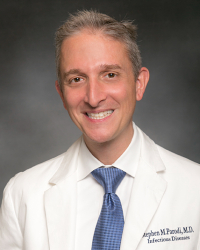Permanente physician leader Ainsley MacLean, MD, writes about the benefits and barriers of using AI to improve breast cancer screening
Stephen Parodi, MD, interviewed on CNN International about coexisting with COVID
Stephen Parodi, MD, associate executive director for The Permanente Medical Group, recently told CNN International’s Kim Brunhuber that fewer COVID surges are likely to occur thanks to the large percentage of the U.S. population who are vaccinated as well as the large number of people who became infected with omicron and developed at least temporary immunity. However, he urged caution as society learns to coexist with COVID.

“We want to be realistic,” said Dr. Parodi, national infectious disease leader for Kaiser Permanente. “With other diseases like influenza, we don’t just simply lift restrictions immediately. We take a measured approach, so when there’s a lot of disease present, we take a lot of action. We make people isolate. We make sure that people — if they’re exposed — quarantine themselves. We’ll want to continue that sort of guidance, hopefully with a little more clarity.”
Given the current prevalence of COVID in California, Dr. Parodi said he expects it may be too soon for the state to lift indoor masking restrictions. Nonetheless, this week California confirmed that its statewide mask mandate, which requires everyone to wear face coverings indoors regardless of vaccination status, will be lifted February 15.
“The reason is that people can still be symptomatic and still spread the disease,” he said. “The only way to protect against that is to have people wearing masks, particularly indoors, which is where you’re more likely to spread it.”
With the omicron surge waning, it is now time for clinicians, teachers, school administrators, and policymakers to “come to a consensus about what thresholds we can use, in terms of community transmission, to allow us to start dropping those restrictions,” Dr. Parodi added.
Also slated for February 15 is a meeting of the U.S. Food and Drug Administration’s vaccine advisory committee, which will review Pfizer and BioNTech’s request for emergency use authorization of their 2-dose COVID-19 vaccine for children 6 months through 4 years old.
The ability to vaccinate young children would be a game changer, Dr. Parodi said.
“Since the start of the pandemic, 1.6 million children have been infected and 287 of them have died, so that alone tells me we [should] get the youngest and vulnerable vaccinated,” he said. “Secondly, it’s going to allow us to more safely keep schools open because children of that age range are often siblings of children who are in school … If we want to open up society more effectively, I think having those children vaccinated is going to be critical.”
Note: Watch the interview with CNN International, which appeared in two segments, below.
Part 1
Part 2


